Coming Back to America
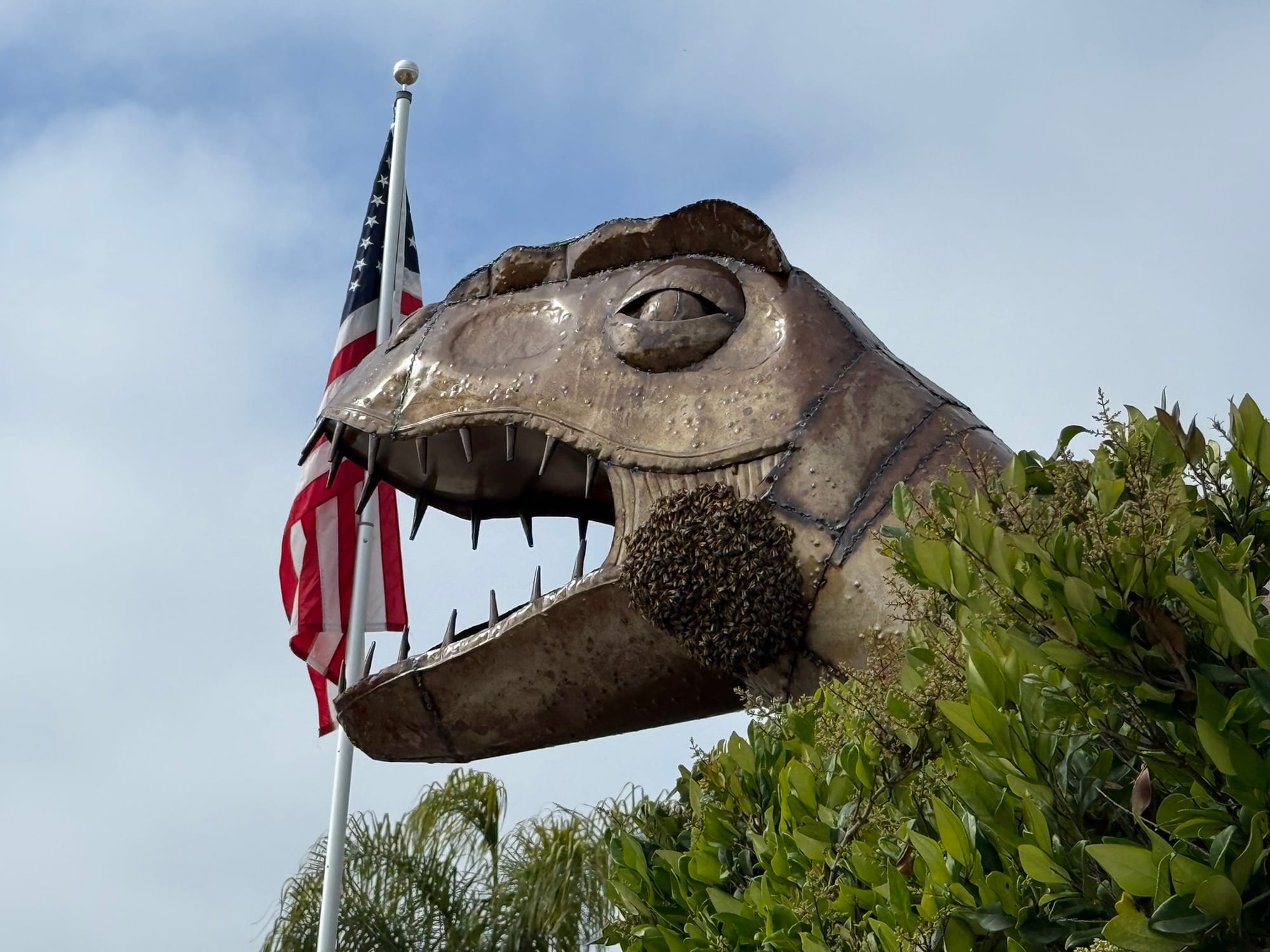
I'm back in the USA. I haven't been here since December 16th.
I spent the last month in Sulawesi, and then spent a few more days in Jakarta and Singapore before boarding a flight back to California, where I'm staying with my parents for a few weeks. I was afraid of what in God's name might confront me at customs, but a combination of Global Entry and the privilege inherent in being a white person who was born in the USA meant that I sailed through with no particular issues.
Modern travel really is a bit like teleportation, at least as compared to say, the old days when heading home from Asia meant months at sea and (depending on destination) rounding Cape Horn. Now, you sit in a seat for 15 hours and watch television you never get around to watching on land, while nice people in uniforms feed you a regular supply of crackers and whiskey in little plastic cups.
So, here I am. Back in America, at least for now.
What's It Feel Like to Be Back in the U.S.?
Everyone is asking me how it Feels to be back. The implied context is clear: since you've been gone, the U.S. has changed in immense and dark ways. Has it done so in such a way that a recently-returned traveler, not boiled in water like the rest of America's frogs, might be capable of picking up on it?
Of course, I know about all the dark and horrible changes. After all, I've been watching all this in excruciating detail and in real time from Asia. I was getting better mobile data reception in Sulawesi than I get in my living room in Boston, Massachusetts. Back in the day, when you traveled somewhere even somewhat remote, you might not hear about your country being overrun by barbarian hordes or jack-booted fascists for weeks, if not months.
You actually could get off the plane, or just pick up a newspaper in the nearest metropolitan area, and be confronted with world-changing news that you'd spent long stretches of time being blissfully unaware of. Nowadays, this degree of surprise about global affairs is a far rarer and more, arguably, precious thing.

And no, I suppose it doesn't feel any different, to be geographically back in the U.S. - or at least, to be back in Southern California. People walk on the beach and talk about their jobs and their Pilates classes. The swallows are returning to Capistrano. My mom reports that she's noticed that all the Trump signs except for one have mysteriously vanished from the harbor at Dana Point, which we're willing to take as an improvement. I have noticed a disturbingly large number of Cybertrucks on the road, but then again, I have also noticed a lot of people who have slapped apologetic-sounding stickers on the backs of their Teslas.
This is, of course, usually how it works when countries slide into authoritarianism.
It's almost never like a movie where vast legions of jack-booted soldiers spread out to every community in the country to poke guns in people's faces. In the early days of such brutal and frightening times, everything remains largely the same for most people, on most days. This goes double for privileged people in privileged areas.The mechanism of oppression extends itself highly unevenly as it starts to twist itself into its mature form, especially when you're dealing with clown-show-like (albeit still incredibly dangerous) mechanisms of oppression devised by the historically incompetent likes of Donald Trump and Elon Musk.
And painful as it is for you and me and our all-too-aware friends and associates to acknowledge, a lot of people in the U.S. are still in the very earliest stages of starting to pay attention to any of the horrors that we've been grappling with since January. Think of these Americans as sea cucumbers rolling gently with the tide on the ocean floor - creatures whose rudimentary and primitive sensory equipment has only just begun to alert them to the fact that a hungry crab is beginning to nibble on their ass. And our fellow citizens have, at least started to respond to threatening new stimuli in their environment. Per polls that came out on April 23rd, Trump's approval rating is worsening rapidly.
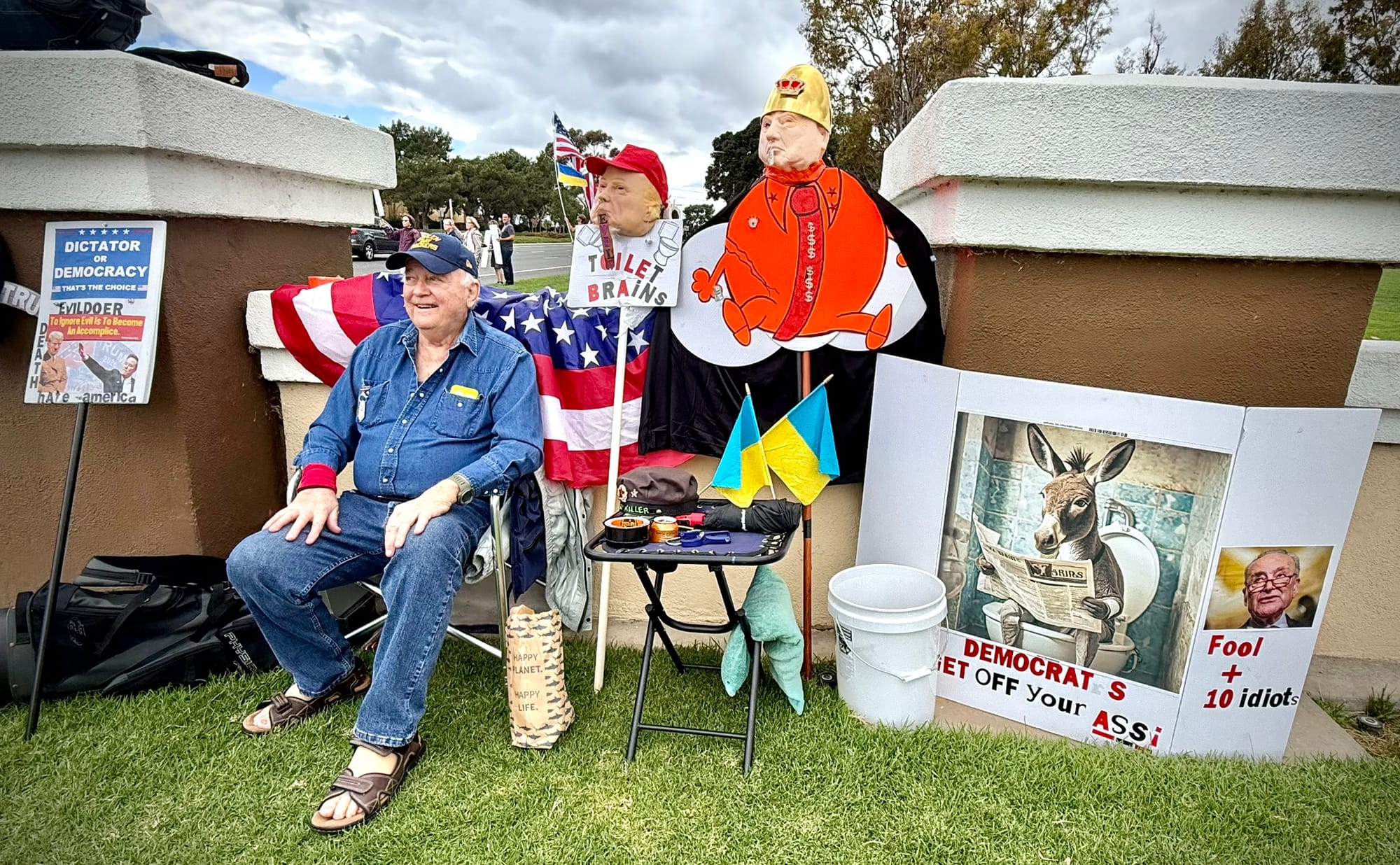
It is also encouraging to remember that people are protesting right now, even if the media too rarely reports on it, and even if the usual assortment of boring blowhards on social media dismiss said protests as Inadequately Hardcore because they're not fire-bombing a Wal-Mart. I went to the regular Sunday protest organized by the 50501 Movement in Irvine the other day, and it was a wholesome experience: a few hundred nice, normal people with their dogs and their kids and handmade signs, parading up and down a four-way-intersection outside of City Hall in tandem with the street lights.
There were drinks, snacks, and glitter-glue for last-minute sign touch-ups. The majority of the people who drove by honked approvingly, or gave us a thumbs-up. The only negative feedback I recall seeing came in the form of a few thumbs-down motions and a couple guys in embarrassing Childcrusher 4000 GTX pickup trucks revving their engines extra loud as they drove away in an effort to remind us that, I don't know, they owned a really stupid car. (The people in Teslas mostly were supportive of us).
The cops were nowhere in sight. The protest is becoming a social thing, a way for people to get to know other members of the community while admiring each other's signs likening Donald Truck to a parasite - wood tick, deer tick, luna tick, get it? We're in for a long battle here, and in my opinion, this kind of friendly and community focused protest movement is a great way to get more people activated.
I don't know what will happen next, after our fellow invertebrates start to realize that they're being besieged by predators, but I maintain hope that something will happen.
Consider this: when threatened, even a sea cucumber is capable of shitting its own guts out to drive off predators.
In my heart, I believe - or want to believe - that the American people are also capable of shitting their own guts out to save the country.
Eventually.
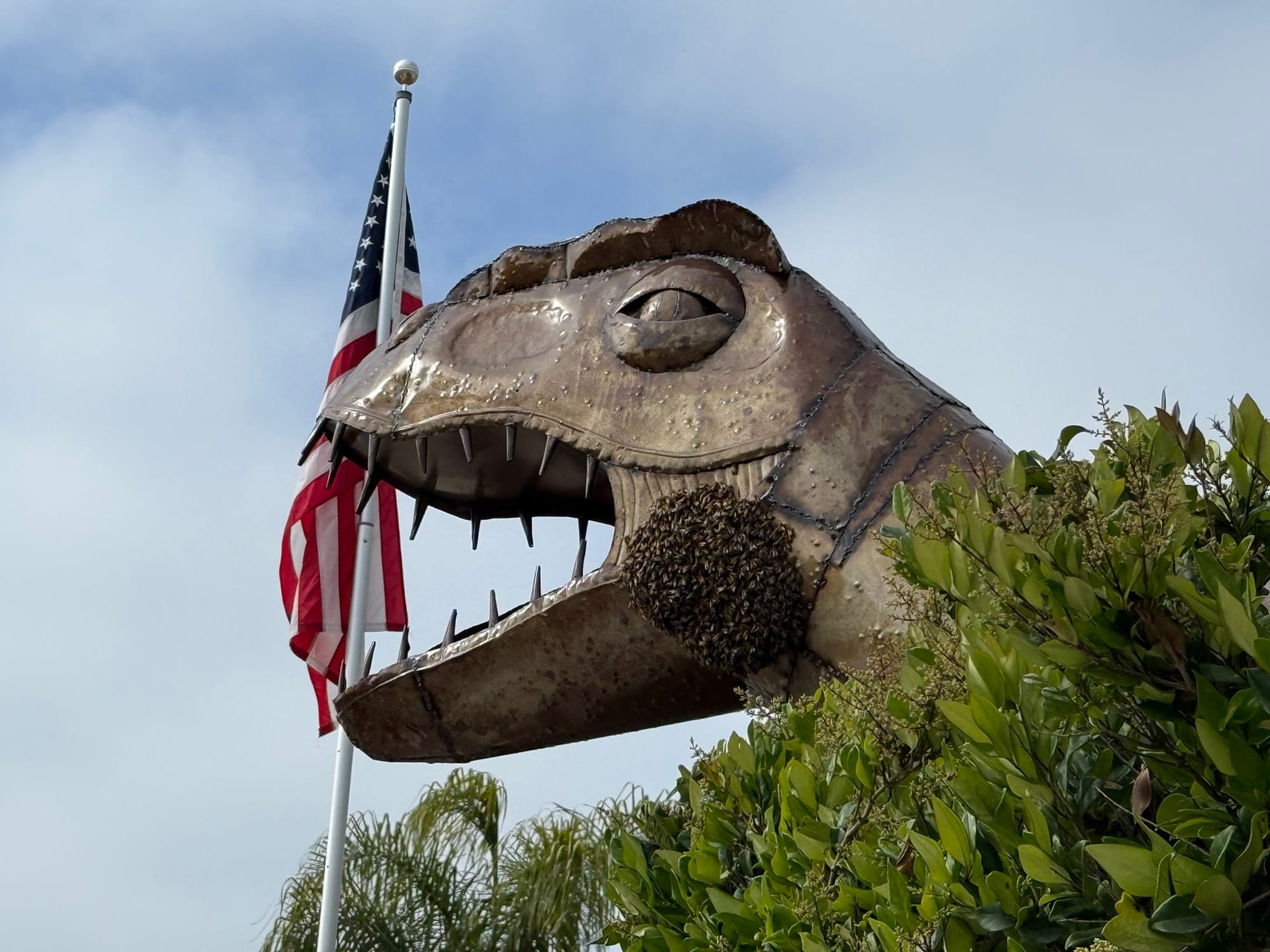
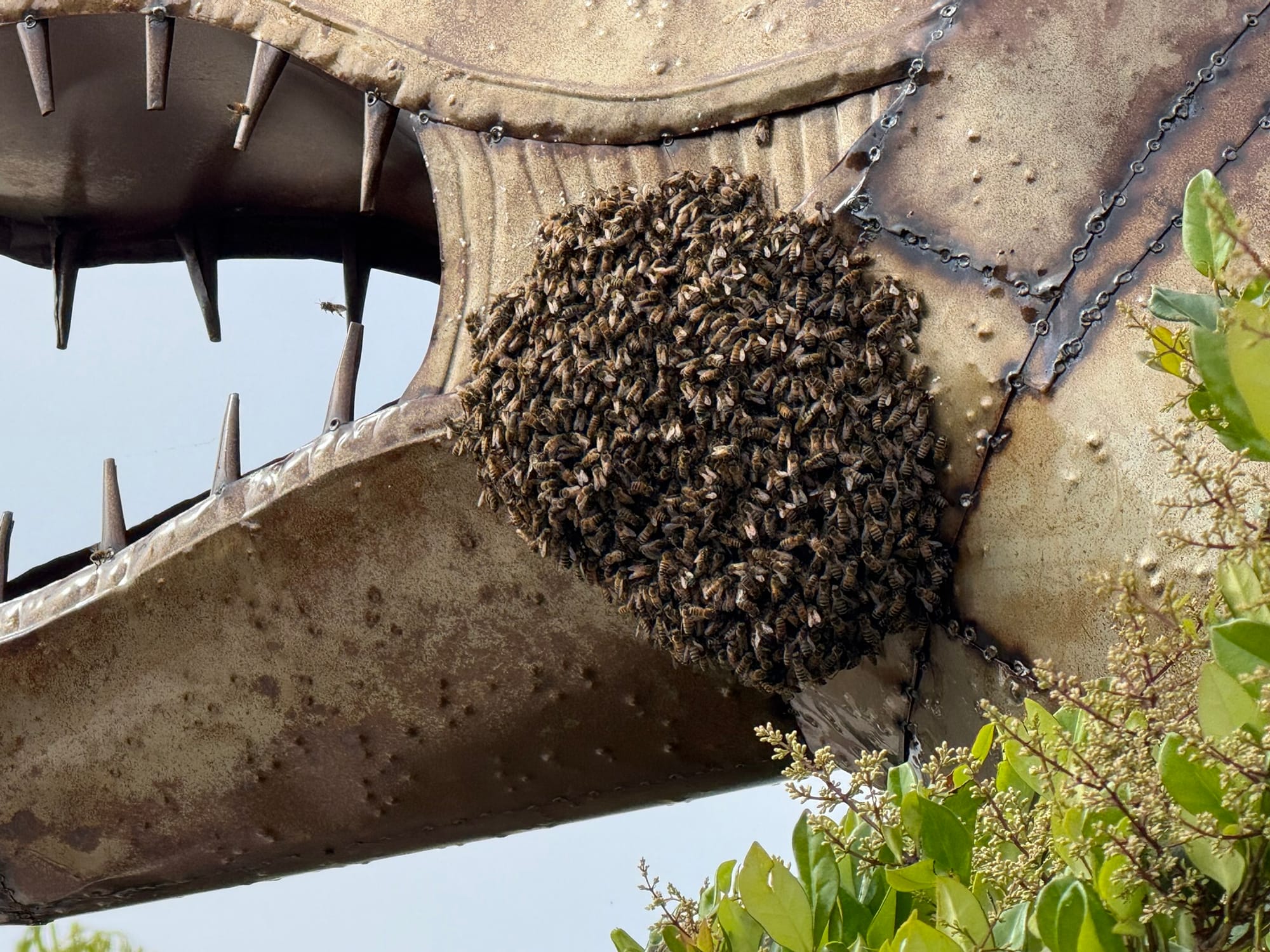
bees on a dinosaur in Dana Point - is this a metaphor for something?
What Do People Outside of the U.S. Think About All This Nonsense?
While I've been away, many Americans have been asking me what the rest of the world thinks of us.
I am unqualified to answer this, as I am an American who lacks access to a global polling mechanism, but here's some wild guesses.
I've noticed that many well-meaning Americans who lack international travel experience seem to assume that people from other countries are far more hostile to American travelers than they actually are. In my experience, people around the world are entirely capable of separating Americans (plural) from the individual American tourist they happen to be interacting with. I've traveled a lot internationally throughout my life, and I have never encountered somebody who treated me negatively simply because I'm an American. I endeavor not to be an asshole when I travel, I (mostly) succeed at this, and people pretty much everywhere respond with the same energy.
Many Americans with limited international experience also seem to grossly overestimate how much time people from other countries spend thinking about American politics. Yes, the US is a 800 pound nuclear armed gorilla that attracts a lot of attention, but the vast majority of humans alive on this planet today are concerned with more local and immediate matters - jobs, what to make for dinner, water buffalo husbandry - than they are about the latest stupid crap Elon Musk said on the Internet.
Regarding our current apocalyptic political moment: yes, a few people I've met in Asia have wanted to chat with me about it in the last few months. Mostly, they want to know why Americans decided to re-elected Donald Trump.
When I can tell the conversation is going that direction, I usually lead with a variation on this: "The first thing you need to remember is that Americans are very stupid. Too many of us have also been so spoiled that we've falsely convinced ourselves we don't need to pay any attention to politics."
I tell them about all the horrors of the Trump and Musk administration, and why I didn't vote for this but why I think it's still my responsibility to figure out what to do about it as an American, and how I sincerely hope the bone-assed idiocy of my countrymen doesn't end up harming the rest of the world. Frequently, the non-Americans I talk to end up offering condolences to me - which is appreciated, albeit not something I think anyone else is obligated to give me.
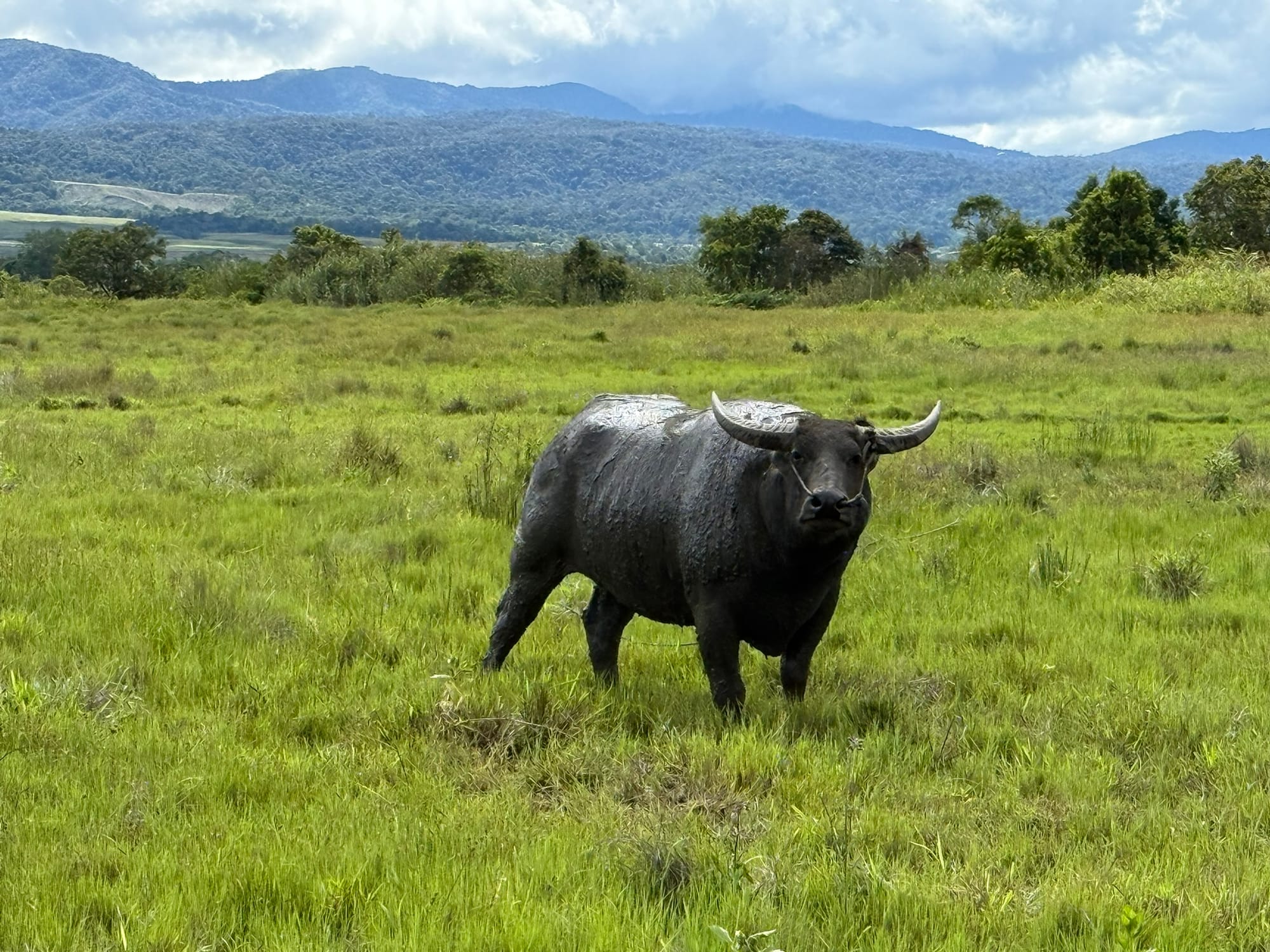
In recent months, I've also encountered a few smart non-Americans who were under the genuine impression that Donald Trump would be better for the economy than Biden. Which I don't exactly blame them for - it's easy to see how someone from outside the U.S. could get that impression if they're just occasionally checking in on international media reports about American politics. The key difference between them and Trump-positive Americans: when I explain why this is not my case, they don't try to argue with me. They're mostly just bemused by how different my take is from what the media (by which I mean American media, which disseminates outwards to everywhere else) has been telling them about Trump for years.
I had my most memorable conversation about the state of modern America with Petrus, my tour guide in the remote Bada Valley of Sulawesi. We were eating dinner during a rain storm in the kitchen area of our home stay accommodation, little toads coming in from inside and hopping around our feet on the concrete floor.
Petrus is from Tana Toraja, a culture which places enormous importance on the provisioning of top-shelf water buffalo for funerals. If you're really doing it right, you're supposed to have a buffalo from each of these three categories at the festivities: a castrated buffalo, an albino buffalo, and one with black and white patches. This can cost thousands of dollars.
"Torajans spend so much money on these water buffalo nowadays," Petrus lamented to me. "They go into a lot of debt." Per Petrus, it's been a bit of a buffalo status-symbol arms race up there in recent years, with people trying to out-do each other for sheer buffalo volume and fanciness at one's relatives funerals. People are even doing imports from elsewhere in Indonesia, or from other countries.
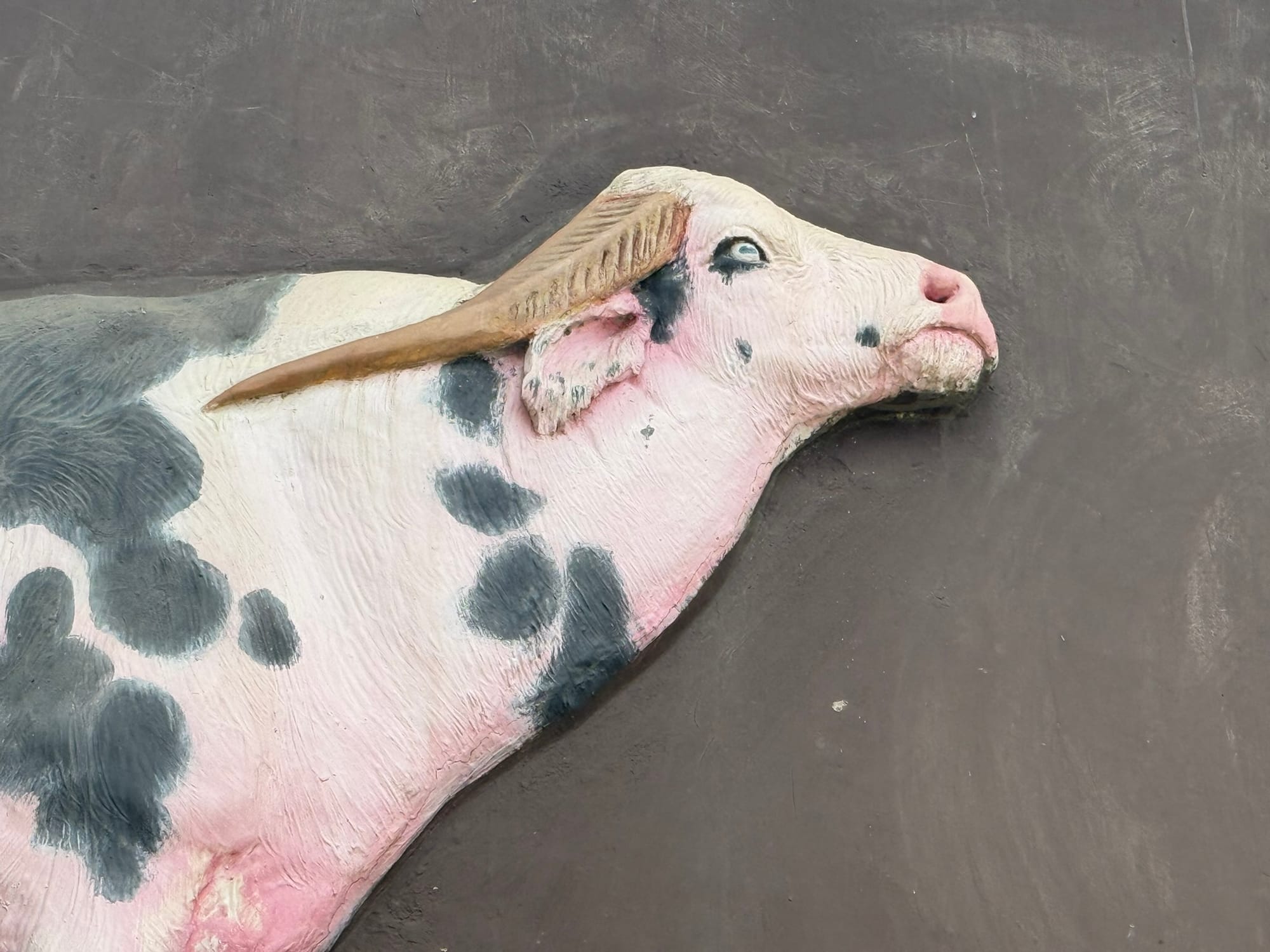
And, importantly, these aren't buffalo that are used for practical purposes, like rice-farming or moving heavy things. They're primarily living status-symbols, intended to wallow around in nice muddy holes and to be admired up until the point when they're slaughtered and cooked at a funeral ceremony, where the meat is then distributed among the attendees. Petrus found this modern trend towards bovine excess to be rather unsustainable. Tacky.
"Oh, so it's like a lot of Americans with their big pick-up trucks," I said. I explained that Americans pay as much as a hundred thousand dollars for these trucks - which are far more expensive in Indonesia than they are in the US, relatively speaking, and are thus an ultra-luxurious rarity - but then they don't actually use them for work. They just use them to drive 10 minutes to the grocery store to buy bread, or to back over an unsuspecting area toddler.
Which is, I said to Petrus, a lot like paying thousands of dollars for a buffalo that you're just going to kill for a funeral. Except that you can't eat a pickup truck, so I think the buffalo is, all things considered, a lot more practical.
Petrus thought about it for a minute, after expressing amusement at the lunacy of owning a truck you didn't actually do anything with, and agreed with me. Yes, we concluded, Torajans with their buffalo and Americans with their pickup trucks were expressing a similar human tendency (although I still think that Torajan buffalo overconsumption is a lot more forgivable than American pickup truck overconsumption.). In that moment, I think we both understood each other's cultures, in all their infuriating variety, a little better.
Perhaps this is what travel is, in the end, all about.
